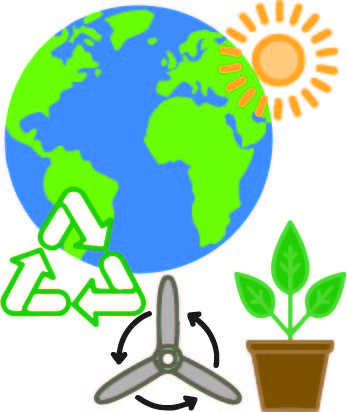COVID-19 Lockdown and Pollution on Earth

Elizabeth Kaiser graphic
In the early months of 2020, COVID-19 started to become a prominent issue. This infectious disease has initial symptoms such as cough, fever, fatigue and headache. With this widespread disease being introduced into society and infecting 143,027,162 people as of April 20, 2020, many countries put in effect a “lock-down” or a “shelter at home” order. This included not leaving the house for anything besides basic needs. Around 131 countries went into some form of lockdown, either national or local, by April 7, 2020. Fewer people traveled which led to less pollution. So, did the COVID-19 global pandemic affect air quality and pollution on Earth?
During the early stages of the pandemic, and currently, many people were conducting research about what COVID-19 is and the effects of it. One type of research that has been overlooked is the effect on the environment with the lockdown. In one article, “Air Pollution and Critical Air Pollutant Assessment During and After COVID-19 Lockdowns,” it was found that “air pollution levels were positively correlated with [travel] reduction during lockdown.” These findings suggest that pollution levels did decrease with the lockdown stages, and that the levels of AQI, or air quality index, for four cities, Daegu, Korea, Tokyo, Japan, Wuhan, China and Mumbai, India. AQI levels are measured as good, moderate, unhealthy sensitive, and unhealthy. The researchers found that in 2020 all four of these cities had better air quality. This reduction has been shown in Wuhan, changing from an average of 150 AQI to 100 AQI, and Mumbai, changing from 150 AQI to 70 AQI. Air quality research in Central China during the pandemic has also shown a decrease in the AQI as much as 45.1%. Other countries have been shown to follow the same pattern as China, such as India.
Do we think that these effects can last? Two staff members at UW- Platteville were interviewed to see what they thought.
Lynette Dornak, Associate Professor in geography, said that these effects on pollution due to the COVID-19 lockdown can be relevant “temporarily and regionally. COVID lockdown itself will not influence anything nationally, but in a region with heavy population and pollution, the lockdown can have a temporary effect on air quality.”
This is similar to what Wendy Stankovich, UW- Platteville Senior Lecturer in the biology department said, “Air pollution emissions declined drastically in a month for China, Europe and United States during the lockdown.”
Both agree that the lockdown did have some impact on the pollution problem, but they also noted that this lockdown is unlikely to produce any long-term effects. Dornak and Stankovich had both specifically mentioned how they had read some recent studies that show the pollution levels are where they were prior to the lockdown due to people resuming normal transportation use, which contributes to NO2 and CO2 levels.
With the positive correlation of the lockdowns and the environmental benefits, will people in the future start to reduce their transportation use or will this data be overlooked?




Cori Wiedholz | Apr 29, 2021 at 8:31 pm
Very good paper and questions. Agree 100% that air quality worsened once businesses reopened and lock down was lifted. I live in Phoenix where there is a lot of smog in the air. When the shelter in place was started within 1 month you could see our mountain ranges vividly – very much showed transportation definitely has an effect. Now that we are open the smog has returned 🤨